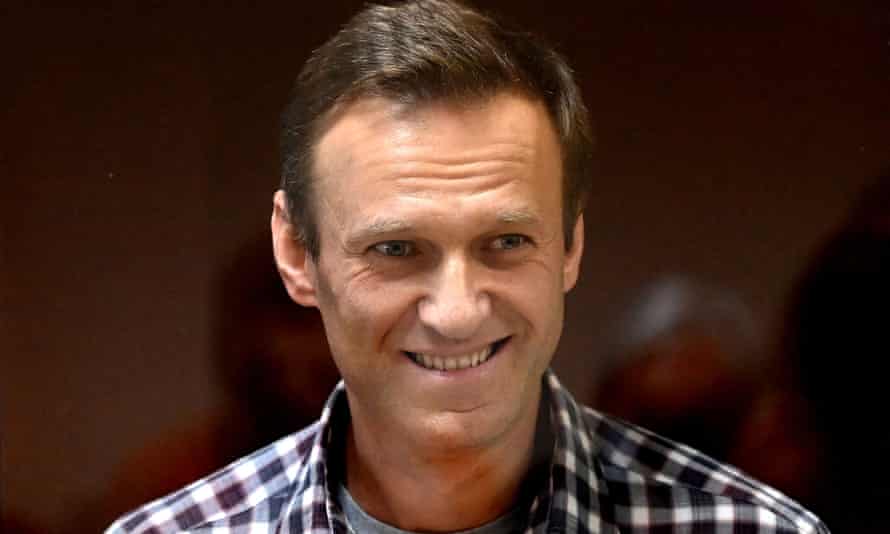A Brief Colonial History Of Ceylon(SriLanka)
Sri Lanka: One Island Two Nations
A Brief Colonial History Of Ceylon(SriLanka)
Sri Lanka: One Island Two Nations
(Full Story)
Search This Blog
Back to 500BC.
==========================
Thiranjala Weerasinghe sj.- One Island Two Nations
?????????????????????????????????????????????????Saturday, April 17, 2021
Russian prosecutors move to liquidate Navalny’s ‘extremist’ movement
Seeking to designate organisation as extremist group is most sweeping assault on opposition supporters yet

Andrew Roth in Moscow-Fri 16 Apr 2021
The Moscow prosecutor’s office has announced that it will seek to designate Alexander Navalny’s Anti-Corruption Foundation and his regional political headquarters as “extremist groups”, moving to in effect liquidate the jailed opposition leader’s political organisation in Russia.
It is the most sweeping assault yet on supporters of Navalny, and comes after his two-and-a-half-year sentence on embezzlement charges and the arrest of his top aides on various charges following large protests in January and February.
In a statement released on Friday evening, the law enforcement body said it was seeking the designation usually reserved for violent organisations such as al-Qaida or Aum Shinrikyo, because it believed Navalny’s organisations were “creating conditions for changing the foundations of the constitutional order, including through the scenario of a ‘coloured revolution’”.
Coloured revolutions were pro-democracy uprisings in former Soviet republics in the mid-2000s now seen in Russia as western-backed coups. Navalny’s organisations have strongly criticised Vladimir Putin and his government, but have not called for any kind of armed rebellion to overthrow the Kremlin.
The decision, if approved, threatens to sever Navalny from his supporters in the regions and even from his financial donors, many of whom could be liable for financing an extremist group if they continued to provide support.
“They’ve decided to steamroll the Anti-Corruption Foundation and the headquarters,” wrote the head of the organisation, Ivan Zhdanov. “We won’t surrender.”
In a statement, he said: “The Kremlin has just demanded that anyone who does not agree with them to be called an extremist … It’s absolutely clear that the Kremlin’s new attack is connected with the planned protest and the elections in September.”
Leonid Volkov, another close Navalny ally, said the Friday evening press release was a “test of public opinion” and called Navalny supporters to make their voices heard.
The prosecutor’s office said that it had applied for a court ruling to recognise both organisations as extremist, which, if granted and upheld on appeal, would allow the government to fine and imprison members of the pro-Navalny groups.
On Friday, a former camera operator for Navalny was sentenced to two years in prison on extremism charges for writing two strongly worded tweets that said top Kremlin officials “didn’t deserve to live”. The tweets came after a regional journalist set herself on fire in an act of protest and died.
In the statement, the prosecutor’s office also claimed that Navalny’s organisation was acting in place of international bodies in Russia whose activities had been deemed “undesirable”. The statement in effect calls Navalny’s movement a front for western interests.
Navalny’s political movement has evolved over the last decade from a lone gadfly blogger on LiveJournal to a guerrilla newsroom, an opposition research centre and a campaign strategy headquarters seeking to unseat the United Russia party by channelling votes to its most likely opponents.
The Anti-Corruption Foundation has angered Russia’s elites by publishing investigations into their expensive watches, yachting trips, lovers’ trysts, inflated procurements and other aspects of government corruption that Navalny says has characterised the Putin era.
On Friday, it published its latest investigation into a lavish residence allegedly used by Putin, which is reportedly fitted out with a luxury spa complex with cryo chambers and a float pool, and which it claimed was rented from a close ally of Putin’s using taxpayers’ money.
The continuing investigations have proven that Navalny can be dangerous to the Kremlin even while he remains on hunger strike in a Russian prison. He was arrested upon returning to the country in January following treatment for a poisoning attempt on his life that he, in a joint investigation with Bellingcat, traced back to the Russian FSB.

